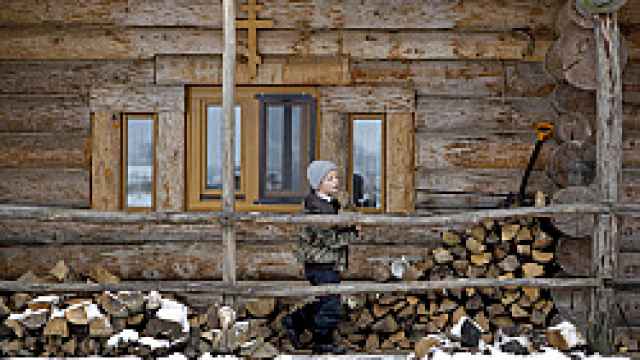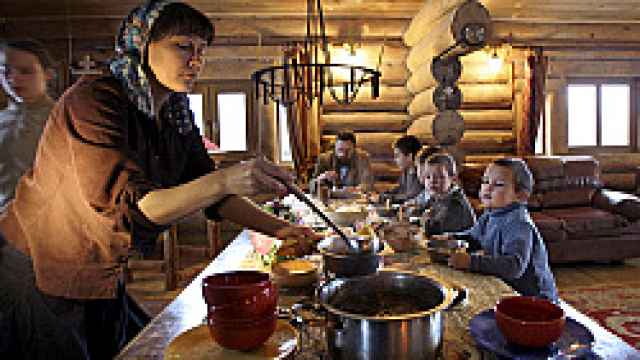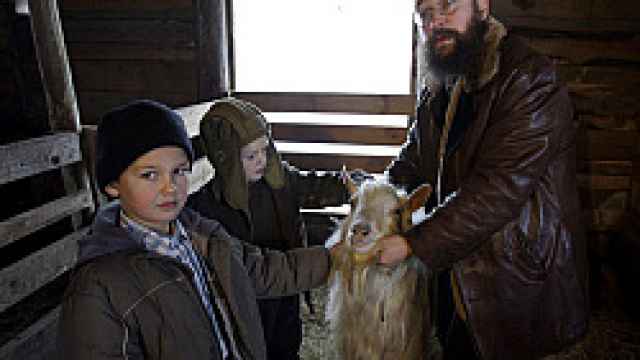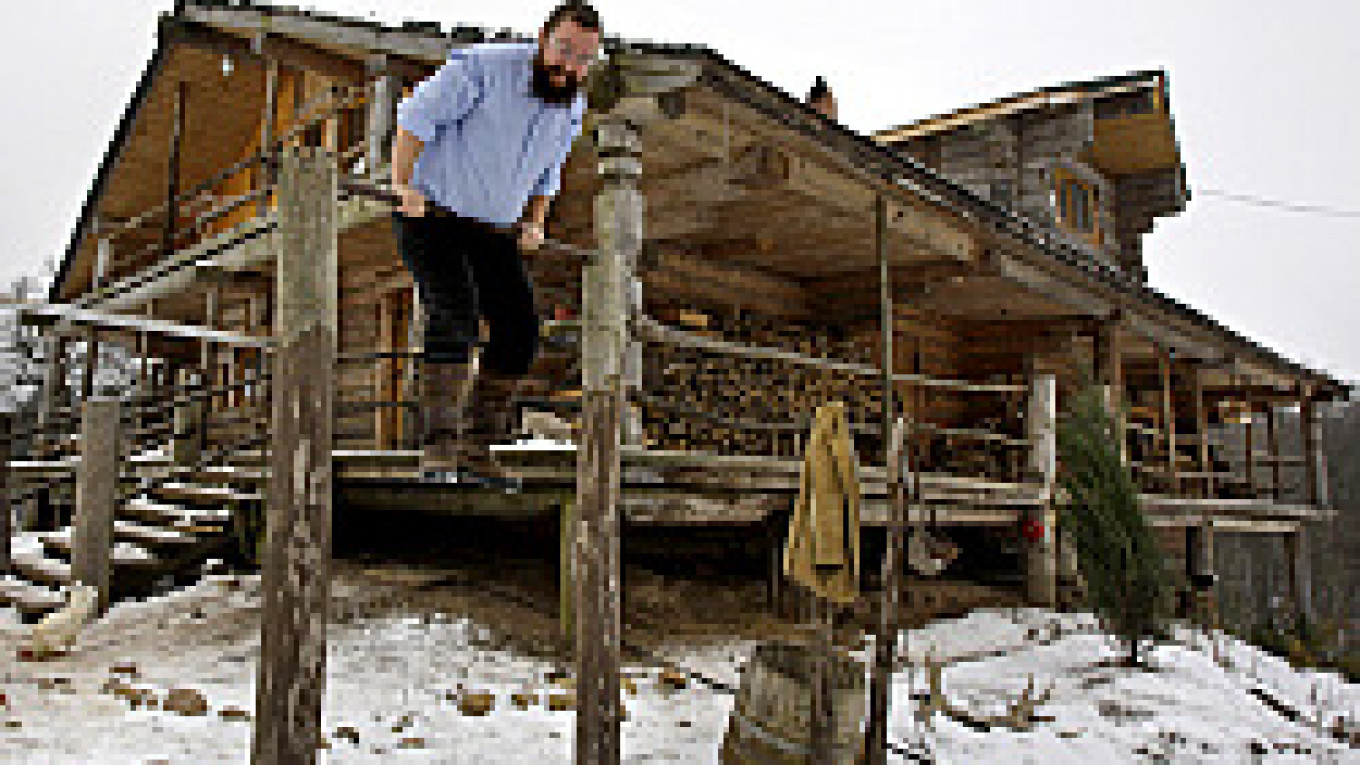That's because German Sterligov, a one-time boy wonder of Russia's young market economy, dropped out of the business world years ago and started raising sheep and other livestock on two farms outside Moscow.
"We're in clover compared to the oligarchs," Sterligov said on a recent weekend. "I've got 100 sheep, a horse, a cow, some poultry and goats."
Now Sterligov, 41, is promoting an electronic barter scheme for commodities trading that he claims could save Russia's foundering financial system.
But he has no plans, he said, to return to the traditional capitalist road, saying his luxury-loving former colleagues among the superrich will soon see the virtues of simplicity and self-sufficiency.
At Sterligov's log cabin about 100 kilometers northwest of Moscow one recent afternoon, hens pecked grain from the snow in front of the porch as he scolded his four sons -- aged 4 to 12 -- for neglecting to feed the chickens properly and for "messing up the stove."
His wife, Alyona Sterligova, who wears a traditional Russian Orthodox head scarf, and a teenage daughter also help him run the farm.
Until 2004, Sterligov was, by his own account, a tycoon with hundreds of millions of dollars in the bank, dozens of businesses, offices on Wall Street and in London and a villa in Rublyovka, a Moscow suburb for the superrich.

Misha Japaridze / AP
Panteleimon Sterligov carrying cut wood outside his house. His father's exit from the high life began in 2004 after he challenged Putin's 2004 re-election bid.
| |
Now he and his family keep busy raising vegetables, sheep, goats and chickens and building peasant-style stools that he sells to a Russian furniture company. He also sells some of the sheep and employs two men to help him on the farm, but most of what he produces is for his family's use.
Sterligov's exit from the high life began when he challenged then-President Vladimir Putin in his 2004 re-election bid. The ex-tycoon, who now sports a long beard and brown leather hunting boots, claimed that he sank the bulk of his fortune into his campaign, which went nowhere after election officials denied him a place on the ballot.
In debt and out of favor with the Kremlin, Sterligov said he decided to flee Moscow. "I had to sell the house, not to mention my businesses, offices and stocks," he said.
Sterligov said he, his children and his wife, who was seven months pregnant, left Rublyovka in the summer of that year and pitched a tent in the forest outside Moscow -- "the only free place to stay."
From that point on, he followed in the footsteps of other wealthy Russians from centuries past, including author Leo Tolstoy, who sought to return to the land in search of spiritual peace and Utopian dreams.
With $100,000 left from the sale of the Rublyovka mansion, Sterligov built three simple log houses and bought some sheep.
Sterligov, who made his first million by the age of 24, has long been drawn to grand gestures and seemingly Quixotic causes. He once tried to promote alcohol abstinence and made a macabre offer to sell 50,000 oak coffins to the United States before the Iraq invasion.
Sterligov's love of nature comes with a deep religious and social conservatism: He has publicly denounced gays, abortion and women who wear trousers. A female reporter who visited him recently was told to show up in a skirt or not come at all.

Misha Japaridze / AP
Alyona Sterligova feeding her husband and sons Mikhei, 4, right; Panteleimon, 6; Sergei, 8; and Arseny, 12, as her daughter, Pelageya, gives her a hand.
| |
"There's more freedom here," Sterligov said. "I'm not dependent on anyone. We're totally self-sufficient."
Teachers come from Moscow to teach the boys Russian and mathematics. Sterligov teaches them history himself and says other subjects are irrelevant. His 18-year-old daughter, the eldest child, studies history at Moscow State University.
Despite his isolation and anti-materialist views, Sterligov still has friends among Rublyovka's rich.
"They all envy me," he said. "They are perfectly aware they are prisoners. I'm like a free Cossack. I have no one to boss me around."
Alyona said she is happy to live a peasant life and raise her five children. "Life in Rublyovka looks unreal now, very artificial," she said.
The Sterligovs live in Nizhnevasilyevskoye in winter and spend the rest of the year on a sheep farm in Sloboda, 20 kilometers away.
Though he denounces big business, Sterligov recalled Russia's roaring 1990s with a certain nostalgia.
"It was interesting back then because I had no other goals in life" than to become wealthy, he said. "And I did. It was sheer sport."
Boris Nemtsov, who as deputy prime minister was among the leading economic reformers of the 1990s, describes Sterligov as "an unusual character."
"He is an interesting person," said Nemtsov, now part of the political opposition. "He's not like everyone else. There are very few people -- in big business in particular -- who would dare to give up everything, move to the countryside and do a farmer's work."

Misha Japaridze / AP
Sterligov and his sons Sergei, left, and Panteleimon treating an ill goat.
| |
He and former business associates, he said, have set up an "anti-crisis commodity transactions center" for commodity bartering. "It is an electronic substitute for money, not linked with the dollar, euro or ruble," he explained.
Few of Moscow's investment bankers seem even to have heard of Sterligov's project. And there are no signs that Russia is willing to return to the barter trading that was common here in the 1990s.
Sterligov predicted that agriculture and land ownership will soon become the new oil for the oligarchs.
"A lot of them are looking at the land and cows now," he said. "Metals are no longer valuable. It's sheep, cows, oats, grain, olive oil, honey that's turned into gold."
Does Sterligov secretly long to rejoin the ranks of Russia's industrial barons?
"If I were told -- take over five factories or you'll get shot, I'd say, shoot away. I don't want this drudgery any more," he said as he picked up a log and threw it into the stove.
A Message from The Moscow Times:
Dear readers,
We are facing unprecedented challenges. Russia's Prosecutor General's Office has designated The Moscow Times as an "undesirable" organization, criminalizing our work and putting our staff at risk of prosecution. This follows our earlier unjust labeling as a "foreign agent."
These actions are direct attempts to silence independent journalism in Russia. The authorities claim our work "discredits the decisions of the Russian leadership." We see things differently: we strive to provide accurate, unbiased reporting on Russia.
We, the journalists of The Moscow Times, refuse to be silenced. But to continue our work, we need your help.
Your support, no matter how small, makes a world of difference. If you can, please support us monthly starting from just $2. It's quick to set up, and every contribution makes a significant impact.
By supporting The Moscow Times, you're defending open, independent journalism in the face of repression. Thank you for standing with us.
Remind me later.


